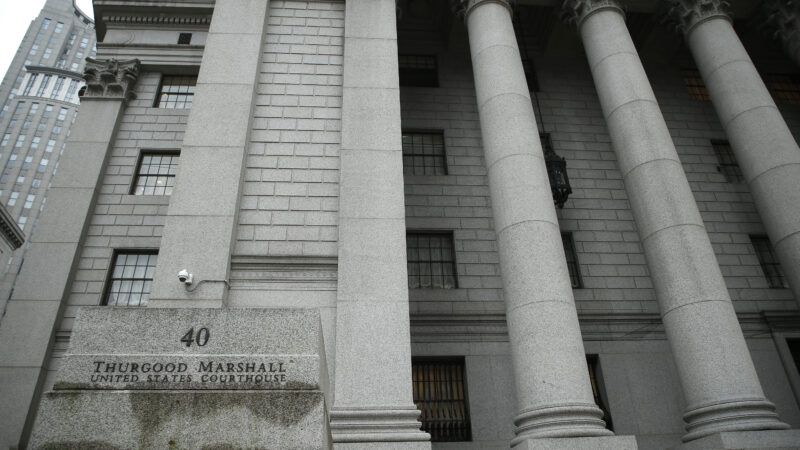Second Circuit Rules Intent To Racially Balance NY High Schools Is Unconstitutional
Judge Joseph Bianco’s decision emphasizes that constitutional rights and protections belong to individuals, not groups.

A federal judge ruled Tuesday that an alternative admissions program to New York City's competitive high schools is unconstitutional if it intended to achieve racial balancing. Although the program does not prescribe racial quotas or favor candidates directly on the basis of race, a criterion was added in 2018 to achieve a higher representation of black and Hispanic students, according to the plan's announcement.
In Chinese American Citizens Alliance of Greater New York v. Adams (CACAGNY), the Pacific Legal Foundation (PLF) won a decision in the U.S. Court of Appeals for the 2nd Circuit that could roll back the expanded Discovery Program to New York City's specialized high schools (SHSs). The decision has broader constitutional implications for facially neutral discrimination—policies that are applied equally and superficially neutral but intended to produce disparate outcomes for individuals on the basis of immutable characteristics.
In December 2018, plaintiffs filed a motion for preliminary injunction against New York City's Department of Education's (DOE) Discovery Program. The complaint alleged that the program's facially neutral selection process disparately impacted Asian-American applicants to the SHSs.
New York's SHSs are described as "prestigious, highly competitive institutions that are among the best high schools in the country," by the editorial board of The New York Times. In 1972, the Hecht-Calandra Act legally enshrined regular admissions to the SHSs as "solely and exclusively by taking a competitive, objective and scholastic achievement examination."
Civil rights groups have long complained that the SHSs do not reflect the demographics of New York's high school student population and regard the Specialized High Schools Admissions Test (SHSAT)—the admissions process established by Stuyvesant in 1934—as racially discriminatory, reports The New York Times. In 2018, the Office of the Mayor reported that only 9 percent of SHS offers that year went to black and Latino students, despite 68 percent of NYC's high school students belonging to these racial groups.
To address these racial disparities, then-Mayor Bill de Blasio and NYC DOE Chancellor Richard Carranza announced the expansion of the Discovery Program in June 2018. Per the Hecht-Calandra Act, the Discovery Program offers SHS admission to students who do not meet the SHSAT cutoff score and are certified as disadvantaged by their local school. Carranza added the requirement that a student must attend a school with an Economic Need Index (ENI) of 0.6 or above.
CACAGNY plaintiffs alleged the DOE instituted the ENI requirement as a proxy for race to engage in unconstitutional racial balancing. U.S. District Court Judge for the Southern District of New York Edgardo Ramos acknowledged that the architects of the Discovery Program's expansion "estimated 16 percent of offers [going] to black and Latino students" compared to 9 percent before the program's expansion. Ramos also admitted that these projections "showed a slight decline of Asian American and white enrollment."
Nonetheless, Ramos concluded that the "Plaintiffs cannot prevail on their Equal Protection claim" due to a lack of aggregate discriminatory effect on Asian-American students, who still received more offers to the SHSs compared to any other racial group following the expansion of the Discovery Program. Ramos also insisted that "the Court need not reach any conclusion with respect to whether Defendants enacted the reforms with discriminatory intent."
Ramos's decision means that a facially neutral, intentionally discriminatory policy that fails to achieve its end is constitutional. PLF strongly disagrees, arguing in its January 2023 opening brief to the 2nd Circuit that aggregate disparate impact is merely one factor pertaining to the "ultimate question: whether the Defendants acted with impermissible discriminatory purpose."
Judge Joseph F. Bianco of the 2nd Circuit concurred with PLF on Tuesday. Bianco's opinion states in no uncertain terms that "an aggregate disparate impact on Asian-American students" is unnecessary to establish an Equal Protection Clause claim under the 14th Amendment.
Bianco clarifies that the lower court must allow plaintiffs to conduct discovery into discriminatory intent—an explicit reversal of Ramos's opinion. If such intent is proven, "a negative effect…on individual Asian-American students applying to SHSs would be sufficient to trigger strict scrutiny," a stringent constitutional standard most laws and policies fail to satisfy.
The 1st Circuit disagrees. In its December 2023 decision in Boston Parent Coalition for Academic Excellence v. Boston (Boston Parent), another case litigated by PLF, Judge William Kayatta affirms that even undisputed evidence of the defendants' intent to racially balance certain schools "is not by itself enough to sustain the Coalition's claim."
PLF submitted a petition for writ of certiorari to the Supreme Court in April 2024 following Kayatta's decision. On Wednesday, PLF submitted a supplemental brief adding a fourth reason for granting the petition: the "clear circuit split" between the 2nd Circuit's ruling in CACAGNY and the 1st Circuit's decision in Boston Parent.
Tuesday's "Second Circuit decision…is a triumph not only for CACAGNY but for the principle that admissions should be based on merit, not race," says Glenn Roper, PLF attorney for CACAGNY. If the Supreme Court grants writ of certiorari to Boston Parent and agrees with Bianco's opinion, no policy will be "immunized from strict scrutiny because it underperforms in an unconstitutional mission" to discriminate on the basis of immutable characteristics.


Show Comments (10)